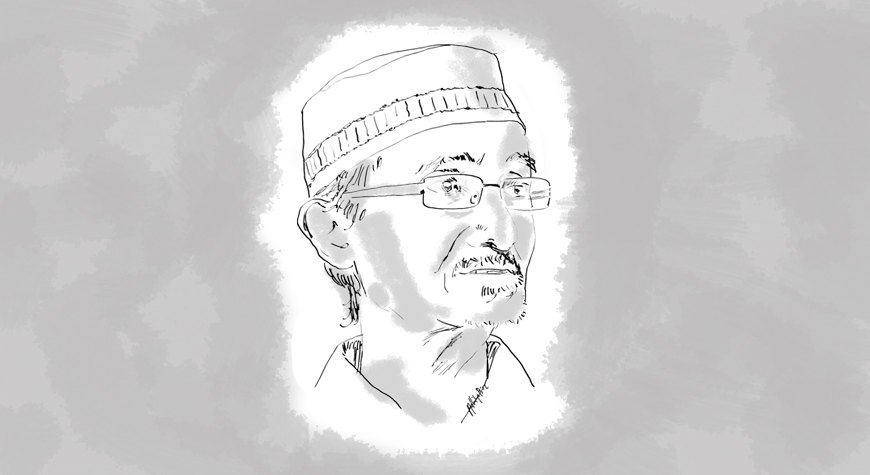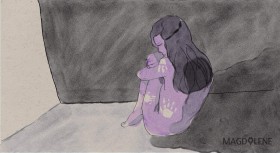Vagina is not the word you would expect to be thrown casually in a conversation with an ulema. But Husein Muhammad, or Kyai Husein as he is affectionately called, did just that, and not in a derogatory manner.
After all, he is a champion of youth reproductive rights, initiating a campaign on Islamic-based sexual and reproductive health rights in Islamic boarding school (pesantren), through his Fahmina Institute in Cirebon, West Java.
The principal of the Dar al Tauhid boarding school in Arjawinangun, Cirebon, Husein is also a commissioner of the National Commission on Violence Against Women (Komnas Perempuan), has founded a series of women NGOs, and has written various articles and books on Islamic jurisdiction (fiqh) on women, gender problems in pesantren and pluralism.
These ventures earned him the title feminist kyai, which is an Indonesian word for a revered Muslim scholar.
Kyai Husein was not born with a grasp on gender equality, nor did he come from a progressive family in that sense.
“I used to be conservative, with literal understanding on religious texts. I used to think that the texts were always right, and the flaws were in the society,” said Husein, 60, in an interview with Magdalene at his house in Cirebon.
Graduated from Cairo’s Al Azhar University in 1983, Husein was asked to manage the family boarding school, which is affiliated with Nahdlatul Ulama (NU), the largest Muslim organization in the country. The school has about 500 students, from kindergarten to high school levels.
“My grandfather founded the pesantren. He has many daughters but like in a kingdom, the leader has always been the man in the family,” said the slender and self-possessed man.
It was not until 1993 that Husein got in touch with gender issue, thanks to NU’s program to enhance pesantren and society, an initiative of the 30-million strong organization’s iconic leader and late President Abdurrahman Wahid.
Getting initiated
In the 1980s, Gus Dur, President Abdurrahman’s popular moniker, wrote a lot of articles on pesantren as the agent of social change and the importance to make it the basis of society and ideas. He created a series of programs for pesantrens, including the contextualization of reference books and the establishment of study groups to discuss religious text interpretation, theology and also gender studies.
Husein said he was at first resistant with the ideas of gender equality, but a realization hit him that despite biological differences between men and women, there were not a lot of differences in anything else.
“Women are said to be emotional, and their place are in the kitchen. But I realized that gender roles could change—it’s not something given or established. I became more aware of the facts, became more rational. I felt that the religious texts, when read literally would marginalize and inflict losses on women,” he said.
The central texts that he deemed problematic for their discriminative tones against women are Surah (chapter) An-Nisa (Arabic means women) verse 34 in the Quran, and the particular hadith (prophetic tradition) from Bukhari-Muslim.
Both texts, according to Husein, place women as men’s subordinate, regarding men as more superior. The hadith even states that the source of social unrest is women, including the belief that Adam fell from heaven because of Hawa (Eve).
“Nearly all women’s issues are rooted on those texts, which have segregated and marginalized women. Women have to cover up their bodies, have to be accompanied by spouses or close relatives; they can’t become judges, politicians, etcetera. The ummah (Muslim communities) are loyal to these texts and established kyais endorse these, for fear that changes would disrupt their authorities,” he said.
Husein began to write more about gender issues and insert the ideas into his sermons. He also founded and co-founded the NGOS focusing on women’s issues: Puan Amal Hayati, Rahimah and Fahmina.
In 2001, he published the groundbreaking book Fiqih Perempuan, which dissects Islamic jurisdiction on women issues. Many of the views presented in this book were, and are still against the mainstream Islamic teachings. It rejects early marriage, it says women can marry themselves without the presence of a guardian and that women are allowed to be imam, or prayer leader.
“Many people welcomed the book, but there were certainly a lot of resistances, particularly from hardline groups who called me infidel. I was also reprimanded by my own family and relatives,” said Husein, whose siblings lead many pesantrens in Java.
He said his strength, apart from having social authority as a pesantren leader, lies in the rich repertoire about Islamic teachings and classical Islamic journals and papers.
“Traditional communities are resistant with vocal and vulgar opposition. I think one of the ways to face or reduce the resistance is because I study classical texts, even though they are not necessarily mainstream. Most activists read new books, but I go back to the texts from 7th to 13th centuries to dig the authenticities and the arguments,” he said.
“Different perceptions about religious issues, such as how women have to cover up their bodies, had already existed back in the 9th century. The choices that people deemed Westernized these days, have emerged and debated back in the days.”
Fighting militancy
But still opposition remains, sometimes to the point of violence. In 2006, Fahmina was mobbed by about 50 angry people who accused Hussein as foreign agent and Jewish accomplice. It was at the height of the debates about pornography bill, which Hussein opposed.
“It’s not that I endorse pornography, but there is a personal morality and there is public morality. The state should not regulate the former,” he said.
He was concerned with the increasing numbers of bylaws regulating personal issues like the obligation to wear headdress and the prohibition to wear tight clothes for women, which occurred in several districts.
“The argument is to protect women, but that’s not protecting. That’s marginalizing and returning women to home or domestic area,” said Hussein, whose wife is a legislator for Cirebon regency.
Religious interpretation is increasingly worrying because it is too literal and irrelevant, while it should be contextual, he said.
“It’s a setback with strong conservatism, strengthened radicalism, the longing for the good old days. And the saddest thing is how the government is powerless and let things happen. We should uphold the Constitution and state ideology,” he said.
“Religious tolerance is at stakes. It is dangerous, and as you can see it enables certain religious groups to take matters into their own hands.”
Despite the crisis, he sees some things to rejoice, such as the emergence of young progressive Muslim scholars and ulemas, although few in numbers, and the interfaith dialog groups that work together, including with the police, to face public violence against people of different faiths.
Hussein is also delighted to see the growth of Fahmina, despite its constant financial struggle. From gender issues, its scope has expanded to empowering communities, such as fishermen, street vendors, housewives, migrant workers and rickshaw drivers, to fight for their rights.
Fahmina has also built its own Institute for Islamic Studies (ISIF), which currently has 300 students, all under scholarship as they come from lower economic bracket.
“We build the strength with other pesantrens and young figures. It’s not easy, especially when it’s related to reproductive health. It’s a long and winding process. But I’m happy that more people have shown their supports for our programs,” he said.








Comments